invited NewsDecember 2018
Mr Fayyad participates in the vesicovaginal fistula course in Khartoum, Sudan, where he learns through hands on experience the advanced treatments of this debilitating condition, which affects young women and can occur following complicated pelvic surgery.
November 2018
Mr Fayyad is an invited lecturer at the Lebanese Society of Obstetrics and Gynecology Annual Meeting in Beirut, Lebanon. Mr Fayyad lectures on the laparoscopic surgical treatment of urinary incontinence and vaginal prolapse and on the laparoscopic management of advanced rectovaginal endometriosis.
October 2018
Mr Fayyad is invited to lecture in Dubai at the Emirates Urology Forum and the Pan Arab Urology Congress on the management of complications of vaginal sling surgery and the role of urethral bulking agents in the management of stress urinary incontinence.
May 2018
Mr Fayyad lectures at the RCOG during the Surgical Masterclass in Urogynaecology on the role of laparoscopic ventral mesh rectopexy in the management of full thickness rectal prolapse.
May 2018
Mr Fayyad chairs the surgical management of apical vaginal prolapse session during the Surgical Masterclass in Urogynaecology held at the RCOG.
February 2018
As an internationally recognised expert in laparoscopic (key-hole) surgery in urogynecology, Mr Fayyad delivers the key note lecture on the laparoscopic management of tape and mesh complications at the Annual Emirates Urology Forum held in Dubai, UAE. The meeting focus was on the developments of minimally invasive techniques in urology and pelvic floor surgery.
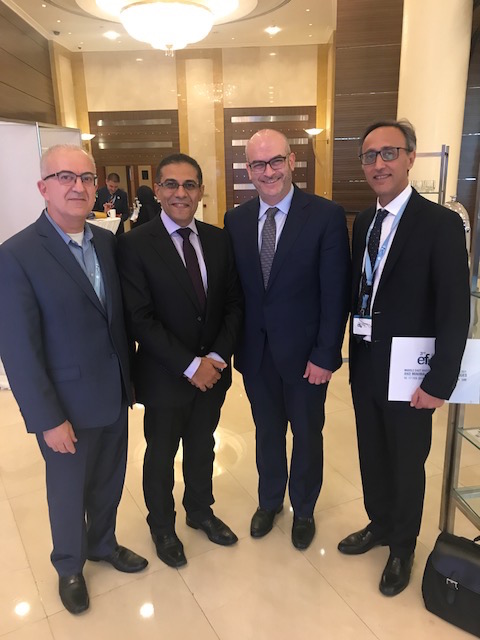
February 2018
Mr Fayyad delivers the invited lecture on the latest laparoscopic tehniques in managing pelvic floor disorders including laparoscpopic prolapse repair using both mesh and native tissues, and the role of laparoscopic surgery in treating stress urinary incontinence in women at the Annual Emirates Urology Forum held at Roda AlMorooj Hotel in Dubai, UAE.
February 2018
Mr Fayyad chairs a roundtable discussion titled managing overactive bladder, clinical dilemmas at the 9th Emirates Urollgy Forum in Dubai, UAE.
February 2018
Mr Fayyad is an expert laparoscopic endometriosis surgeon recognised by the British Society of Gynaecologic Endoscopy (BSGE) who specialises in treating women with complex stage 4 endometriosis. This condition involves severe endometriosis involving the lower bowel and should be treated by expert laparocopic surgeons due to its complexity. Mr Fayyad is one of few recognised surgeons throughout the UK who specialises in treating this challenging condition.
January 2018
Mr Fayyad is an invited lecturer at the annual meeting of the Pan Arab Continence Society (PACS), an affilliate society of the International Continence Society (ICS), held in Dubai, UAE. Mr Fayyad lectured on managing recurrent vaginal prolapse using key-hole, laparoscopic surgery and the demonstrated the latest techniques of managing stress urinary incontinence surgically including native tissue repair.
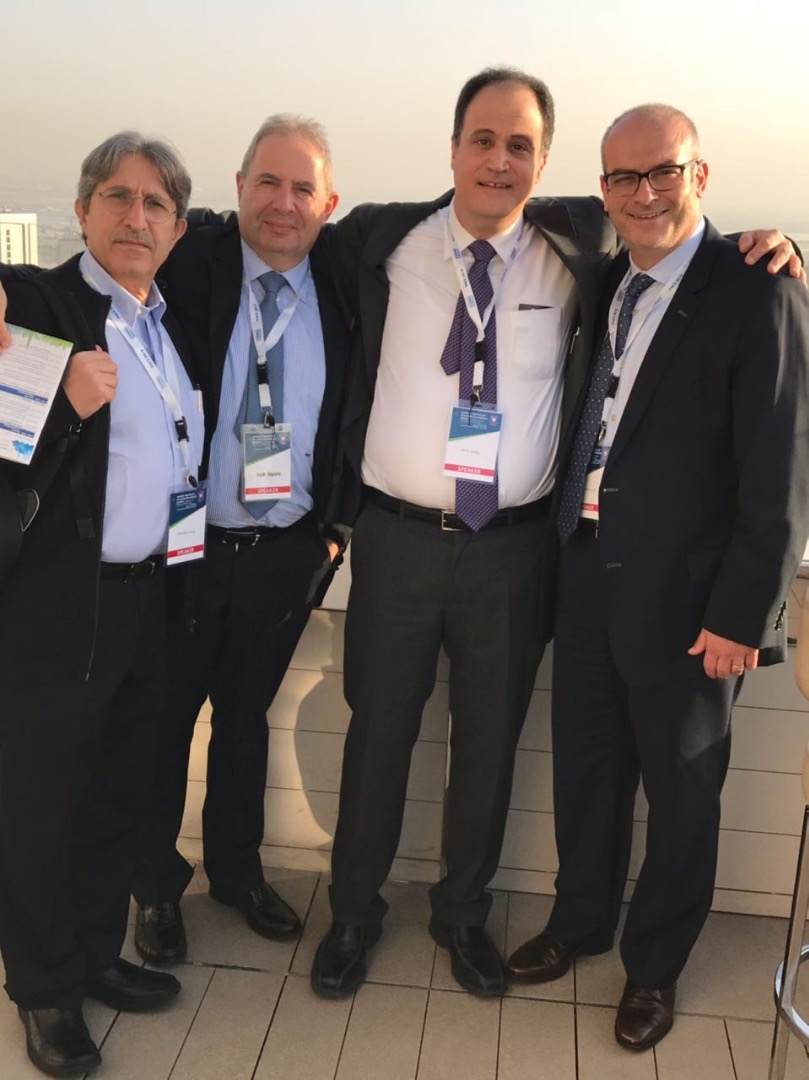
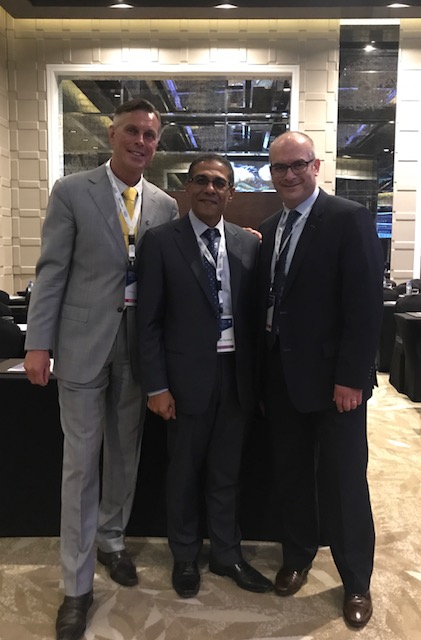
December 2017
Mr Fayyad perofrms a live surgery workshop in laparoscopic urogynaecology at King Hussein Medical Centre, which is the main hospital of the Jordanian Royal Military Medical Services. Mr Fayyad demonstrates the latest techniques of laparoscopic sacrocolpopexy and hysteropexy for women with complex or recurrent prolapse.
December 2017
Mr Fayyad is invited by the Jordanian Royal Medical Services to lecture in the international conference of Obstetrics and Gynaecology held in Amman, Jordan under the patronage of HRH Princess Mona Al Hussein. Mr Fayyad gives lectures on the role of concomitant incontinence surgery at the time of prolapse repair, managing fecal incontinence and rectal prolapse and managing complex cases of pelvicpain due to endometriosis.
October 2017
Mr Fayyad attends a refresher course of the role of urodynamicsinvestigation in women with pelvic floor disorders including pelvic organ prolapse and incontinence. The course was organised by the Bristol Urological Institute.
September 2017
Mr Fayyad gives the invited lecture on uterine preserving prolapse surgery using the laparoscopic approach at the Annual International Continence Society Meeting in Florence, Italy.
June 2017
Mr Fayyad gives the invited lecture in Vancouver, Canada in the laparoscopic surgery Special Interest Group (SIG) meeting during the 42nd International Urogynecology Association (IUGA) Meeting. The lecture covered the techniques of advamced pelvic floor surgery for rectal and uterovaginal prolapse. The group includes the world opinion leaders in the field of laparoscopic urogynecology.

June 2017
Mr Fayyad lectures in the laparoscopic sacrocolpopexy workshop during the 42nd International Urogynecology Association (IUGA) Meeting in Vancouver, Canada.
June 2017
Mr Fayyad's team present a podium viseo presentation on the technique of laparoscopic ventral mesh rectopexy and hysteropexy for complex rectal and uterine prolapse. The video was among the top 5 videos presented from all over the world during the 42nd International Urogynecology Association (IUGA) Meeting in Vancouver, Canada.
June 2017
Mr Fayyad chairs "Meet the Experts" table on the management of recurrent prolapse during the 42nd International Urogynecology Association (IUGA) Meeting in Vancouver, Canada. Mr Fayyad discussed the surgical management options of recurrent vaginal prolapse including laparoscopic (key hole) techniques, tecniques of vaginal mesh insertion and the technique of laparoscopic paravaginal repair for recurrent anterior vaginal wall prolapse. Delegates who attended this "Meet the Experts" session were from USA, Canada, Japan and Switzerland
March 2017
Mr Fayyad gives the invited lecture to the 27th Annual Congress of the French Obstetrics and Gynecological Society Meeting (27 Salon de GYNECOLOGIE OBSTETRIQUE PRATIQUE) in Paris, France. Mr Fayyad lectured on the Functional Anatomy of Laparoscopic Sacrocolpopexy and Sacrohysteropexy and other aspects of treating complex and vaginal prolapse. Other speakers included Professor Bruno Deval (Paris), Professor Massimo Porena (Perugia), Professor Stefano Salvatore (Milan) and Professor Bary O'Reily (Cork).
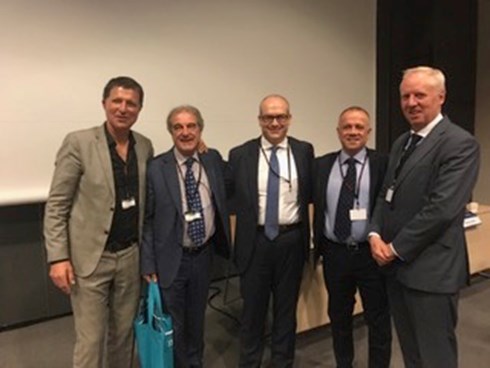
February 2017
Mr Fayyad gives two key note lectures in the 18th conference of the RCOG representative congress in Jordan, Palestine and Syria. The lectures covered the topics of uterine preserving prolapse surgery using the laparoscopic approach and the modern management of recurrent prolapse using key hole pelvic floor surgery, where Mr Fayyad is an expert in the topic.
December 2016
Mr Fayyad lectures at the 5th Emirates International Urological Conference in Dubai. Mr Fayyad gives the invited lecture on the role of synthetic mid urethral slings in the management of stress urinary incontinence. Mr Fayyad was among the international expert panel discussion on the management of recurrent stress urinary incontinence.
November 2016
Mr Fayyad is invited by the French Urogynecology Association to lecture at the annual meeting due to be held in Paris in March 2017 on the surgical anatomy of laparoscopic sacrocolpopexy and hysteropexy for prolapse and surgical techniques of safe surgery in managing recurrent and complex prolapse.
November 2016
Mr Fayyad gives the invited lecture at the Royal College of Obstetricians and Gynaecologists (RCOG) during the Annual Meeting of the British Society of Urogynaecology (BSUG) titled "Does Uterine Prolapse Equal Vaginal Hysterectomy?" in which the latest approaches of uterine preserving prolapse surgery including the vaginal, laparoscopic and robotic approaches are discussed. Mr Fayyad presented the latest data from his original research in the subject of hysteropexy (uterine preserving prolaspe surgery) using the laparoscopic approach.
November 2016
Mr Fayyad chairs and presents at the surgical video session during the Annual Scientific Meeting of the British Society of Urogynaecology (BSUG) held at the RCOG. Mr Fayyad presented surgical tips and tricks for the management of vaginal vault and recurrent bladder prolapse using the laparoscopic sacrocolpopexy approach.
October 2016
Mr Fayyad chairs and preents at the International Urogynecology Association Meeting (IUGA) Exchange program in Begrade, Serbia. Other faculty included Professor Bruno Deval and Professor Barry O'Reily. The Exchange covered topics such as laparoscopic prolapse surgery, management of recurrent prolapse and incontinence and painful bladder syndrome.
October 2016
Mr Fayyad presents at the East Anglia Obstetrics and Gynaecology Society Meeting the latest techniques of managing vaginal prolapse including laparoscopic and vaginal approach for rcurrent and complex prolapse.
September 2016
Mr Fayyad received his elevation to the Fellowship of the Royal College of Obstetricians and Gynaecologists (FRCOG). The fellowship is awarded to consultants who held the membership of the RCOG for more than 12 years and had substantial contribution to the field of Gynaecology including research and education.
August 2016
Mr Fayyad presents at the International Urogynecology Association (IUGA) Annual Meeting in Cape Town, South Africa the safety and outcomes of laparoscopic sacrocolpopexy in elderly women above the age of 70. The presentation showed safety and efficacy of laparoscopic sacrocolpopexy in elderly women.
June 2016
Mr Fayyad gives the invited lecture at the Royal College of Obstetricians and Gynaecologists Surgical Masterclass in Urogynaecology Meeting held in London. The lectures covered the latest research and techniques of vaginal mesh surgery including the complex treatment of recurrent vaginal prolapse. There was also a demonstration of the techniques of transvaginal mesh placement with kit. The attendees were pelvic surgeons from all over the globe who rated the lecture as excellent all around.
June 2016
Mr Fayyad demonstrate the latest technique of laparoscopic sacrocolpopexy and hysteropexy after a visit to the Royal United Hospital Bath urogynaecology unit and teaching the consultants the techniques of complex laparoscopic (key hole) pelvic floor surgery. Surgical Treatments AvailableMr Abdalla Fayyad has been treating cases of uterine prolapse for many years and can offer a number of surgical treatment options. These include the pioneering techniques of uterine suspension using key-hole surgery (laparoscopic sacrohysteropexy) where the uterus is preserved and placed back into its normal position by reattaching pelvic ligaments, which is the ideal operation for most women with uterine prolapse. Other options include hysterectomy, which involves the uterus being removed from the body, usually through the vagina; and uterine suspension, where the uterus is. To find out more about Mr Abdalla Fayyad, take a look around the website. A Professional and Caring ServiceIf you have a vaginal hysterectomy, it's important to be aware that you will not be able to get pregnant afterwards. Nor will you have monthly periods. With this in mind, it's vital that you consider the treatment and its implications carefully before deciding to go ahead with it. Mr Abdalla Fayyad strives to provide a professional and caring service to each and every one of it clients, and is always on hand to answer any questions or address any concerns you may have. To find out more, take a look around the website. May 2016 Lecturing at the American College of Surgeons Annual Congress (Jordan Chapter)Pictures of the invited lecture at the American College of Surgeons Annual Congess on the latest surgical developments in the treatment of pelvic organ prolapse including laparoscopic and minimal access surgery. 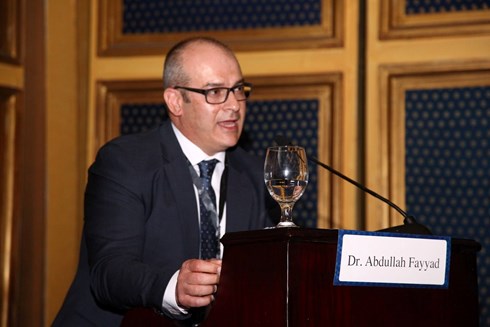
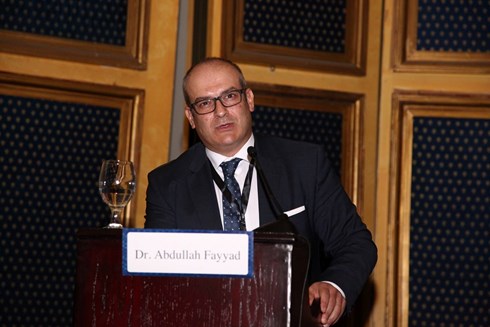
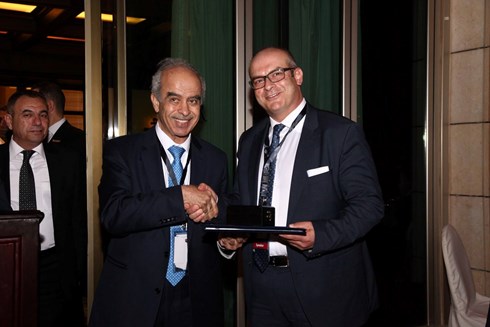
May 2016 Lecturing at the American College of Surgeons Annual Congress (Jordan Chapter)Mr Fayyad delivers the key note lecture on the latest advances in the manaement of pelvic organ prolapse during the annual congress of the American College of Surgeons Jordan Chapter held at the Le Royal Hotel in Amman, Jordan. The lecture covered the latest updates on uterine preservig prolapse surgery using minimally invasive surgery (MIS) and the role of laparoscopic surgery in treating primary and recurrent vaginal prolapse. A Professional ServiceMr Abdalla Fayyad has been treating cases of uterine prolapse for many years, and is revered in his field. He has an excellent reputation, and can be relied upon to put you at ease during every stage of the treatment. He is one of very few gynaecologists who perform minimally invasive key hole surgery to treat prolapse of the uterus by avoiding hysterectomy (preserve the uterus) and restore the normal support of the pelvic organs including the uterus. You can expect to receive a highly professional service at all times. To find out more, take a look around the website. It Won't Go Away on its OwnSome people hope that faecal incontinence will simply go away on its own, and that they won't need medical help. Unfortunately, this is rarely the case, and most sufferers need treatment for this condition. To book a consultation with Mr Fayyad, don't hesitate to call his secretary Jo Bedwell on 01582 714449. Take a look around the website to find out more. April 2016Mr Fayyad and his team's original work on pregnancy outcomes following laparoscopic sacrohysteropexy has been accepted for publication in the academic journal "Neurourology and Urodynamics". This research is the first published in the world literature on pregnancy and delivery outcomes following the innovative technique of laparoscopic sacrohyteropexy that replaces vaginal hysterectomy for uterine prolapse (prolapse of the womb). April 2016Mr Fayyad's original paper on the efficacy and safety of single sheet laparoscopic sacrohysteropexy has been accepted for publication in the very prestigious journal journal "Neurourology and Urodynamics". The data that will be published show the efficay of single sheet laparoscopic sacrohysteropexy in the treatment of uterine prolapse in women followed up to 5 years post operatively. April 2016Mr Fayyad and his team's research work on "The safety and efficacy of laparoscopic sacrocolpopexy in the elderly above the age of 70 years old" has been accepted for presentation at the International Urogynecology Association (IUGA) Annual Meeting due to be held in Cape Town, South Africa in August 2016. What Causes Urinary IncontinenceThere are many possible causes of urinary incontinence. Stress incontinence usually results from the weakening or damaging of the muscles that prevent urination (i.e. the pelvic floor muscles and urethral sphincter). Urge incontinence may result from over-activity of the detrusor muscles, which are used to control the bladder. To find out more about Mr Abdalla Fayyad, take a look around the website. March 2016Mr Fayyad is invited to lecture at the American College of Surgeons Jordanian Charter annual meeting due to be held in Amman, Jordan. The lecture will cover the latest advances in pelvic organ prolapse surgery including the laparoscopic approach to rectal and vaginal prolapse. The meeting is due in May 2016. Possible TreatmentsTrying the least intrusive treatments for faecal incontinence is often recommended in the first instance. These include dietary chances, pelvic floor muscle training and bowel retraining. If these treatments don't work, surgery will be considered. Surgery may involve repair of posterior vaginal wall prolapse, key-hole surgery for rectal prolapse, and sacral nerve stimulation. Occasionally, an operation to repair the anal sphincter muscles will be needed. To find out more about Mr Abdalla Fayyad, and the treatments he offers, take a look around his website. You can book an appointment by calling his secretary Jo Bedwell on 01582 714449. Get the Quality Help That You NeedPerhaps you’ve found yourself waking up a number of times during the night to go to the toilet or have experienced leakages whilst coughing, exercising or sneezing? If so, Mr Fayyad can help. Some leakages are related to temporary conditions like infections, whilst others may be linked to more permanent issues. Whatever the case, you can count on Mr Fayyad to get right to the root of the issue. Find out more by heading over to the home page today. What Treatment is Offered?Mr Abdalla Fayyad offers a range of treatments for urinary incontinence, usually starting with conservative therapies such as pelvic floor exercises and bladder training. Surgery may also be considered if other treatments are unsuccessful, such as tape or sling procedures to support the urethra (urine pipe) and strengthen the muscles that control urination. To book a consultation, don't hesitate to call Mr Fayyad's secretary Jo on 01582 714449. Or to find out more about the treatments on offer, take a look around the website. February 2016Mr Fayyad runs a training session at Leicester General Hospital Urogynaecology department were he instructed consultants and junior doctors on the use of the latest techniques in the surgical management of stress urinary incontinence using Durashpereurethral bulking agent. What are the Symptoms of Faecal Incontinence?The symptoms of faecal incontinence vary from person to person. Some people feel a sudden, urgent need to go to the toilet, and incontinence occurs if they're not able to a toilet in time. Others experience no sensation at all before passing a stool, or may pass a small piece of stool when breaking wind. Whilst some people experience faecal incontinence on a daily basis, for others it occurs only from time to time. Whatever your own experience of faecal incontinence, it can be a highly troubling condition. To find out more about the treatment Mr Abdalla Fayyad can provide, take a look around the website. Highly RecommendedOver the years, Dr Fayyad has treated many women for urinary incontinence and has an excellent reputation across the UK. Whether you're in Luton or elsewhere, if you're seeking an experienced physician who can help you to overcome this condition, don't hesitate to get in touch. To find out more, take a look around the website. January 2016 BSUG Meetings FeedbackMr Fayyad received excellent feedback from participants of the British Society of Urogynaecology Annual Scientific Update Meeting in Urogynaecology held at the RCOG in November 2015. Mr Fayyad demonstrated the surgical techniques of laparoscopic ventral mesh rectopexy and hysteropexy for multiple compartment vaginal prolapse and the use of vaginal mesh for and recurrent vaginal prolapse. Both presentations included demonstration of surgical videos of Mr Fayyad's surgery and update on the latest data of the above procedures. January 2016Mr Fayyad will provide training and mentoring nationally for consultants performing the urethral bulking agent surgery using Durasphere. The procedure is minimally invasive and is a good option for a subset of women with stress urinary incontinence who are not suited for the vaginal tape procedure. What Does the Procedure Involve?A laparoscoptic hysterectomy is an operation to remove the uterus through four cuts on the abdomen below the navel. This is referred to as keyhole surgery, and the patient can usually go home the very next day. Occasionally, the ovaries and fallopian tubes are removed at the same time (this is called a salpingo-oophorectomy). Laparoscopic hysterectomies are used to treat heavy or irregular periods, fibroids and suspected or proven cancer of the womb or cervix. To discuss this treatment in further detail, don't hesitate to call Mr Fayyad's secretary Jo Bedwell on 01582 714449. Or take a look around the website to find out more. What Does the Procedure InvolvePosterior repair is a procedure that's used to treat prolapse of the back wall of the vagina. It is carried out either under general anaesthetic or an epidural, although on occasion a local anaesthetic can be used. An incision is made in the vaginal skin and and thin muscle in the vagina over the prolapse. The muscle is bought together and the vaginal skin is closed. Mr Abdalla Fayyad is one of the most respected gynaecological surgeons in the field and is highly sought after amongst patients who are looking for a professional and affordable service. To find out more, take a look around the website today. December 2015Mr Fayyad lectures and teaches the latest devlopments of prolapse surgery at St George's Medical School in the cadacer masterclass organised by the London Medical Education Academy (LMEDAC). The delegates were gynaecologists and urologists from all over the world including North and South America and Europe who attended to get an update from the ditinguished faculty running the mastercalss. Are There Any Risks?Mr Adballa Fayyad had carried out this procedure many times before with great success, and so it's very unlikely that anything will go wrong. However, in occasional cases, women may develop an infection after the operation. In 5-10% of cases, the prolapse may return and further treatment will be required. If you'd like additional information about the posterior repair procedure, don't hesitate to call Mr Fayyad's secretary on 01582 714449. Or to find out more about Mr Abdalla Fayyad and the services he provides, take a look around the website. What does the Operation Entail?A laparoscopic hysterectomy involves the removal of the uterus (womb) through four cuts on the abdomen below the navel. This is referred to as keyhole surgery, Sometimes, if necessary, the ovaries and the fallopian tubes are removed too. The procedure usually requires just one night in hospital and you'll be free to go home the next day. It's highly advised that you don't work or drive for two weeks after the operation. To discuss your requirements with Mr Fayyad's secretary Jo Bedwell, call 01582 714449. Take a look around the website to find out more. November 2015Mr Fayyad performs the first UK mini laparoscopic sacrocolpopexy for an 86 year old patient with post hysterectomy vaginal vault prolapse. This is the latest approach in laparoscopic sacrocolpopexy which is less invasive than the traditional laparoscopic sacrocolpopexy with significant reduction of post operative pain and even quicker recovery in the elderly patient population. November 2015Mr Fayyad is invited by the Royal College of Obstetricians and Gynaecologists (RCOG) and the British Society of Urogynaecology (BSUG) to lecture at the 2016 Surgical Masterclass in Urogynaecology orgianised by BSUG at the RCOG in London. The talk will cover the topics of the use of vaginal mesh kits in complex pelvic reconstruction and recurrent vaginal prolapse. November 2015Mr Fayyad lectures at the British Society of Urogynaecology (BSUG) Annual Scientific Update meeting held at the RCOG in London. The lectures include demonstration of the technique of laparoscopic (key-hole) rectopexy and hysteropoexy for prolapse of the uterus and rectum and the technique of vaginal mesh insertion fpr recurrent and complex vaginal prolapse. November 2015Mr Fayyad chairs the key note lecture session at the British Society of Urogynaecology (BSUG) Annual Scientific Update meeting held at the RCOG in London. The session included the key note lecture by Professor Ralf Tunn from Berlin on the use of vaginal meshes. November 2015Mr Fayyad participates in the "Leading lights in Urogynaecology" meeting organised by the European Society of Urogynecology in Warsaw, Poland. The meeting involved discussion and lectures on the latest development in the treatments of urinary incontinence, overactive bladder and prolapse surgery. The meeting attendees were the experts in the field from the UK and Europe. August 2015Mr Fayyad will chair and lecture in the International Urogynecology Association (IUGA) Regional Symposium planned for April in 2016 in Dubai, UAE. The regional symposium will cover aspects of urogynecology important for the MENA region and the lecturers are world experts in their fields. Mr Fayyad will lecture on managment of complex urogynaecology cases and laparoscopic surgery for prolapse and incontinence. July 2015Mr Fayyad runs advanced laparoscopic sacrocolpopexy masterclass at the Luton and Dunstable University Hospital for visiting consultant gynaecologists from Chase Farm and Barnet Hospitals and the Royal Free Hospital. The on site training involved demonstration of live surgery (laparoscopic sacrocolpopexy) and the recent advancements in the field of prolapse surgery using the laparoscopic approach. The attendees gave excellent feedback about the quality of training and the level of advanced surgery demonstrated for women with recurrent vaginal prolapse and post hysterectomy vaginal prolapse. June 2015Mr Fayyad wins the best surgical video award in the Silver Jubilee Meeting of the British Society of Gynaecologic Endoscopy (BSGE) held at Central Westminster Hall in London. The video demonstrated the novel technique of single sheet laparoscopic ventral mesh rectopexy and hysteropexy for advanced full thickness rectal prolapse and uterine prolapse. June 2015Mr Fayyad and his team attend the 40th Annual Meeting of the International Urogynecology Association (IUGA) Meeting in Nice Acropolis Centre. The team presented two papers on the outcomes of laparoscopic sacrohysteropexy for uterine prolapse and the outcomes of Elevate vaginal mesh for recurrent vaginal prolapse. May 2015Mr Fayyad teaches in the surgical urogynaecology and reconstructive urology masterclass sponsored by the International Continence Society (ICS) at St George's Hospital and Medical School, London. The course demonstrated the latest surgical techniques in laparoscopic (key-hole) and vaginal prolapse surgery, with particulalr emphasis on laparoscopic sacrocolpopexy and the use of Elevate PC vaginal mesh. The attendees included consultant gynaecologists and urologists from USA, Europe, Australia and the UK. April 2015Mr Fayyad travels to Hamburg as an invited lecturer and surgeon to demonstrate the surgical techniques of total laparoscopic hysterectomy and laparoscopic sacrocolpopexy to consultants from the UK who joined the one day training course on superior sealing and dissection in laparoscopic surgery run by Ethicon Surgical Division. Mr Fayyad was joined by two otherr faculty members at the European Surgical Institute (ESI), Hamburg, where the training took place. April 2015Mr Fayyad's original research on the advanced techniques of laparoscopic pelvic floor reconstruction will be presented at the British Society of Gynaecologic Endoscopy (BSGE) Golden Jubilee Meeting due to be held in London in June 2015. Mr Fayyad will present an educational video on the technique of laparoscopic sacrocolpopexy for vaginal prolapse management following hysterectomy, and one on laparoscopic ventral mesh rectopexy on the laparoscopic management of rectal prolapse. February 2015Mr Fayyad delivers a key note lecture to the 16th annual meeting of the Royal College of Obstetricians and Gynaecologists (RCOG) committee of Jordan, Palestine and Syria about managemet of apical vaginal prolapse and the new laparoscopic techniques of uterine preserving prolapse surgery. The meeting was held at the Landmark Hotel in Amman, Jordan and Mr Fayyad was among a panel of invited international experts from USA, Europe and Latin America, alomg with Jordanian professors in Obstetrics and Gynaecology. 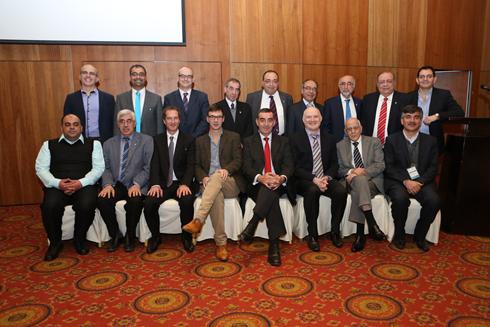 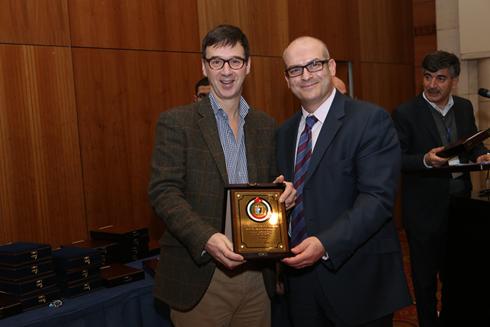 February 2015Mr Fayyad travels to Amman, Jordan to lecture on the surgical management of apical vaginal prolapse and the latest techniques of preserving the uterus at the time of prolapse surgery using laparoscopy. The meeting is a joint meeting of the RCOG and the Jordanian Society of Obstetrics and Gynaecology and is attended by delegates from the MENA region. The invited international faculty including Mr Fayyad are international opinion leaders in their subspecialty and have an established pedigree of reserach and publications in their fileds. January 2015Mr Fayyad attends the laparoscopic urogynaecology meeting organised by the RCOG to discuss the latest techniques in laparoscopic pelvic floor surgery for the treatment of vaginal prolapse and urinary incontinence. January 2015Mr Fayyad's team presented the excellent outcomes of patients treated with Elevate vaginal mesh repair for recurrent vaginal prolapse in the annual meeting of the British Pelvic Floor Society in Bristol on 30/1/15. The work was selected as part of the latest innovations in the field of pelvic floor dysfunction nationally and represents the high quality work performed by Mr Fayyad and his team. January 2015Mr Fayyad original publication on the treatment of stress urinaey incontinence following laparoscopic sacrocolpopexy for complex vaginal prolapse has been accepted for publication in the International Urogynecology Journal and Pelvic Floor Dysfunction, which is the leading journal in the field of urogynaecology worldwide. January 2015Mr Fayyad participates in the British Society of Urogynaecology (BSUG) Annual Meetings Subcommittee meeting in Stoke on Trent to plan the Annual Scientific Update in Urogynaecology Meeting due to be held at the RCOG in London in November 2015. Mr Fayyad will participate as a lecturer in the meeting and will invite other international leading experts in pelvic surgery to participate as lecturers to UK and international particpants. December 2014Mr Fayyad lectures in the Serbian capital, Belgrade, to consultant gynaecologists and urologists from Serbia as part of the International Urogynecology Association (IUGA) eXchange program for promoting urogynaecology in countries where incontinence and prolapse surgery in women is underdeveloped. The other lecturers were Professor Robert Freeman, UK, Professor Bary Bergman, Netherlands, and Mr Gunter Reinhardt, UK. All the speakers including Mr Fayyad are world renowned leaders in the field of urogynaecology. November 2014Mr Fayyad lectures at the Annual Scientific Update Meeting of the British Society of Urogynaecology held at the Royal College of Obstetricians and Gynaecologists in London on the topic of management of concomitant urinary incontinence and vaginal prolapse. As an expert in the field of urogynaecology, Mr Fayyad presented the latest evidence in concomitant vaginal prolapse and urinary incontinence surgery including his own original research in the topic that has been accepted for publication in the leading International Urogynecology Journal and Pelvic Floor Dysfunction. November 2014Mr Fayyad lectures and chairs an advanced pelvic surgery workshop on the management of surgical complications of pelvic floor surgery. Mr Fayyad, as an expert pelvic floor surgeon, gets referred complex and challenging cases and complications to correct, and hence he shared his extensive experience in this field with consultant colleagues from all over the world at the Annual Scientific Update Meeting of the British Society of Urogynaecology held at the Royal College of Obstetricians and Gynaecologists in London. October 2014Mr Fayyad demonstrates to his gynaecology consultant colleagues at the Royal Derby Hospital the techniques of advanced pelvic reconstruction and treatment of prolapse of the vagina and the uterus using key-hole surgery. Mr Fayyad operated st the Royal Derby Hospital on the 9/10/14 and performed laparoscopic hysteroopexy as womb preserving prolapse surgery, and laparoscopic sacrocolpopexy as treatment for vaginal vault prolapse following hysterectomy. Both procedures were performed by keyhole surgery and observed by a group of consultants from the midlands region. September 2014Mr Fayyad lectures at St George's Medical School, University of London to visiting European and UK Gynaecologists on the latest techniques of pelvic organ prolapse treatments. The lectures included surgical tips and tricks videos to demonstrate the Elevate vaginal mesh insertion and laparoscopic pelvic reconstruction using laparoscopic sacrocolpopexy and hysteropexy. The training was organised by June medical and American Medical Systems (AMS). September 2014Mr Fayyad submits his original research on the incidence of new onset stress urinary incontinence following laparoscopic pelvic floor surgery (laparoscopic sacrocolpopexy) to the highly reputable International Urogynecology Journal. August 2014Mr Fayyad's presentation on the outcomes of modified laparoscopic sacrcolpopexy for the managment of recurrent vaginal prolapse at the American Society of Gynecological Surgeons meeting in Arizona is published in the Journal of Minimaly Invasive Gynecology. May 2014Mr Fayyad appears on the hit medical TV series Embarrassing Bodies, live from the clinic. He performed surgery for a young lady with severe urinary incontinence. The surgery involved insertion of tension free vaginal tape (TVT), which cured her incontinence. It was live on Tuesday 20/5/2014, and can be watched on channel 4 on demand, or on line. May 2014Mr Fayyad teaches at the Surgical Anatomy Training Course at St George's Medical School, London organised by June Medical. As a leading gynaecological surgeon in the UK and Europe experienced in vaginal mesh surgery (Elevate vaginal mesh, Americal Medical Systems (AMS)), Mr Fayyad demonstrated the latest techniques in vaginal prolapse and urinary incontinence surgery and applied surgical anatomy. The course ran over two days, and involved fresh cadaveric dissection at the anatomy department of St George's Medical School, University of London. May 2014Mr Fayyad performs the tension free vaginal tape (TVT) surgical procedure for Justine, a young lady with severe stress urinary incontinence on the Channel 4 hit series "Embarrasing Bodies". The operation went very well and Justine was discharged home the same day. The episode will be televised on Tuesday 20/5/2014. May 2014As an accredited subspecialist in Urogynaecology, Mr Fayyad performs mid term assessments of subspecialty trainees in Urogynaecology at the Southern General Hospital in Glasgow. The assessments were held at the Royal College of Obstetricians and Gynaecologists (RCOG), London. Mr Fayyad advised the trainees on the training requirements and expertise needed to become an accredited subspecialist in Urogynaecology. April 2014Mr Fayyad is invited by June Medical to lecture on applied pelvic anatomy of vaginal reconstructive surgery and insertion of Elevate vaginal mesh manfactured by American Medical Systems (AMS). This will be in the cadaveric training workshop aimed at training consultants in the techniques of complex vaginal repair using vaginal meshes. The workshop will be held at St George's medical school in London in May 2014. Mr Fayyad regularly trains consultants from all over the world in complex techniques of pelvic reconstructive surgery. April 2014Mr Fayyad participates in the Channel 4 medical series embarrasing bodies. He performed urodynamic testing on a young lady with severe stress urinary incontinence and planning surgery to treat her stress urinary incontinence using the tension free vaginal tape (TVT) on 1/5/2014. March 2014Mr Fayyad attends the United Kingdom Continence Society (UKCS) Meeting held in the QE2 conference centre in London. As a subspecialist and leading Urogynaecologist, Mr Fayyad performs assessments on behalf of the RCOG of the subspecialty trainees in Urogynaecology in Bristol and Plymouth. March 2014Mr Fayyad runs live surgery training session at the Luton and Dunstable University Hospital for consultants from Lincolnshire which focused on Elevate vaginal mesh repair for recurrent and post hysterectomy vaginal wall and vault prolapse. The training session including demonstrations of live surgery by Mr Fayyad as a leader in the fields of urogynaecology, vaginal prolapse surgery and advanced pelvic reconstructive surgery for urinary incontinence and prolaspe in women.
Jo Bedwell,
Spire Harpenden Hospital,
Ambrose Lane,
Harpenden,
Herts AL5 4BP
|